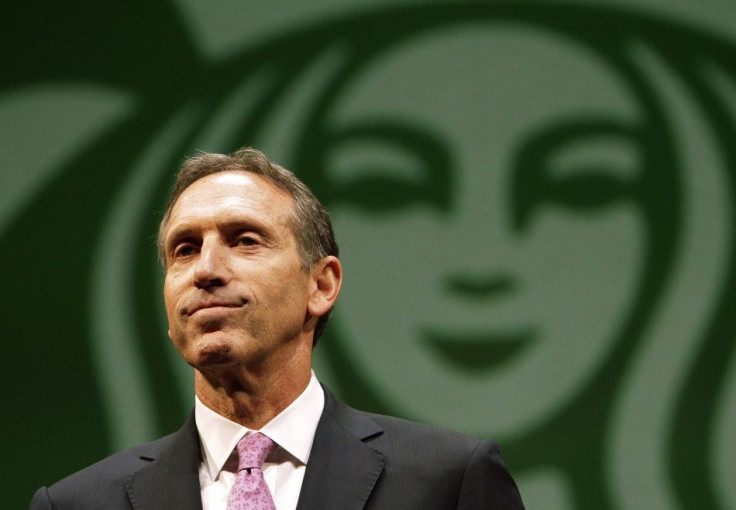Starbucks New Job Creation Fund Follows Trend of Corporate Giving

As economic growth remains tepid and unemployment hovers over 9 percent, Starbucks wants its customers to boost the economy as they buy their latte.
Starbucks announced Monday that it was teaming up with Opportunity Finance Network to launch Create Jobs for USA, which will pool donations for Starbucks customers, partners (employees) and concerned citizens into a nationwide fund for community business lending. Money will be collected both online and in some stores beginning Nov. 1, and those who donate at least $5 will receive a red, white and blue wristband, a symbol of unity in solving the nation's economic challenges.
Small businesses are the backbone of America, employing more than half of all private sector workers-but this critical jobs engine has stalled, CEO Howard Schultz said in a statement. We've got to thaw the channels of credit so that community businesses can start hiring again.
The money donated will go directly into a fund set up by the Opportunity Finance Network, said Lina Page, executive vice president of strategic communications, told the International Business Times. The money will then be doled out to Community Development Financial Institutions, or CDFIs, which are private financial institutions aimed at loaning money in low-wealth and low income communities. Interested institutions that are members of the network can apply for the grants, and the amount will be determined based on the potential to spur job creation.
Opportunity Finance Network is excited about the potential of this partnership in helping deserving communities, Page said.
An initial $5 million donation will be given by the Starbucks Foundation. Then, all of the proceeds from the donations will go to the opportunity finance network, and every $5 donated will result in $35 in financing to support community business, the statement said. Page said for every $1 the institution receives, the CDFIs can leverage that money to gain $6 from other financial institutions.
Although some CDFIs are for-profit institutions, such as banks and credit unions, Page said the money from these donations will go to non-profits exclusively.
Schultz has used his pulpit as head of the coffee giant to advocate for social and political change. Recently, he called on CEOs to stop donating to political campaigns until Congress and President Obama come up with a firm plan to deal with the nation's debt. He recently released a list of about 100 CEOs who joined his pledge.
Starbucks is not the only company to align itself with charitable causes. For example, McDonald's has a long-standing partnership with The Ronald McDonalds House Charities, which helps families with hospitalized children in terms of lodging, support and even medical assistance. At McDonald's restaurants, people can donate by placing money in canisters at the cash register.
According to their tax statement, the non-profit brought in just over $27 million in cash revenue for 2010, although the charity is not required to disclose where the donations came from.
The revenue is a far cry from the McDonald's 2010 revenue of $24 billion. However, Clive Chajet, the chairman of Chajet Consultancy and member of The Wendy's Company Board of Directors, said in an interview with IBTimes that the discrepancy between revenues should not overshadow the company's giving in the first place.
Any donation is a plus, image wise, Chajet said.
Large corporations often donate directly to nonprofits. In 2010, Wal-Mart was the largest corporate donor to nonprofits, giving over $319 million in corporate donations, according to the Chronicle of Philanthropy. Goldman Sachs, Wells Fargo, Bank of America and Exxon Mobil rounded out the top 5 largest corporate donors.
John Unger, an accountant with WeiserMazar, told IBTimes that companies would receive a tax write-off for their promotion of corporate philanthropy, since it can be considered a charitable contribution. Companies can write off up to 10 percent of income for charitable giving, however that would obviously not make business sense for a place such as McDonald's, Unger said.
Tax write-offs, however, are not what drive large companies to implement charitable giving programs.
In a tough economy, any consumer brand that is associated with 'do good,' that's a big plus, Chajet said. It is a big plus to brand image; the companies get publicity and they show that they are bonding with clientele.
Chajet said charitable programs work best with companies that sell daily-use products, such as coffee or fast food. He said initiatives, such as the one Starbucks announced, help get people in the door so they can repeatedly donate, and Chajet expects that other companies will follow suit with their own charitable campaigns.
McDonalds and Starbucks might create a movement to helping business and strengthening image of the brand, he said.
© Copyright IBTimes 2024. All rights reserved.





















